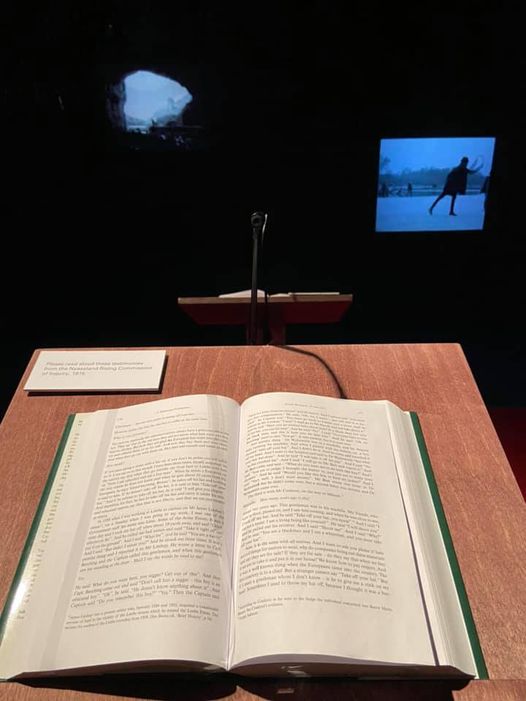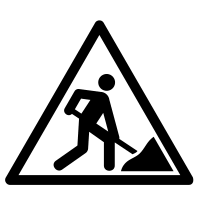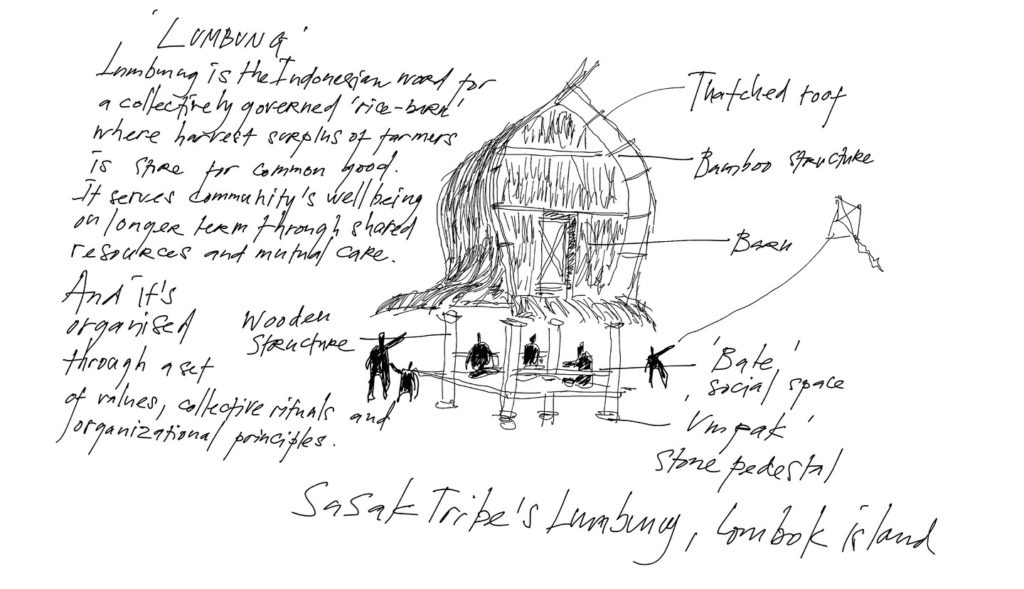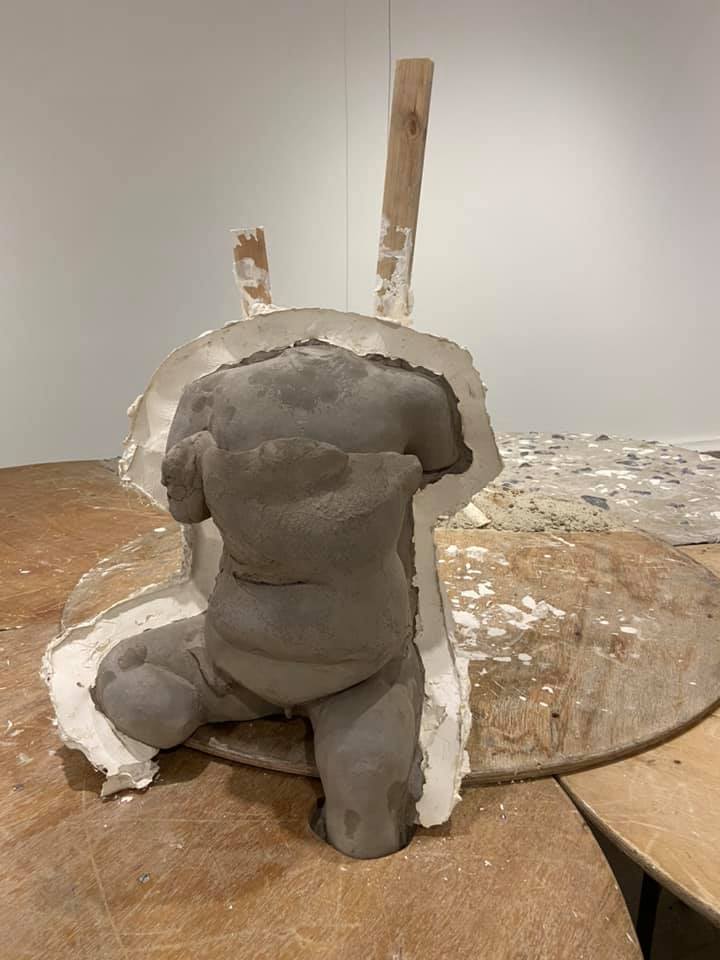Shifting Landscapes: A journal, Un diario | Alessandra Cianetti
14th August 2021This work is part of the performingborders 2021 August newsletter: Shifting Landscapes
A journal of scattered thoughts where the past eight months bled into a fictional timeline of previous years’ memories, a thick-to-navigate present, and sparks of future.
An uneven journey into fragmented reflections that are looking at performingborders through the lenses of the conversations had with the platform’s critical friends, the books read, the shows watched, and the many narratives and detours they offer.
Wednesday 14 July 2021
I am asked to reflect on the conversations we at performingborders have been having in the past months about organisational changes, language, community, and solidarity. It has been a real treat to have so many generous people sharing their time and thinking with us, giving feedback, being critical friends, being supportive friends, being friends.
Looking back at all these exchanges and trying to focus on my take on them, I can only acknowledge a sense of motion among shifting landscapes of thoughts that overlap, run away, go distracted, and come back. This is the point I am at, this is the point I can start from.
What has been really going on in my mind in these past eight months? In this rollercoaster of changes, emergencies, experiencing, fighting, sharing, only one question has stuck consistently with me and has informed my practice lately:
Who is that is putting the rubbish out?
L and T said that what they appreciated about performingborders is its love for the work it platforms, its attention and care for the creation of each piece, that show in every work presented. It being fierce and political, and not afraid of constantly challenging its own structure to implement change.
For some reason – and against my will! – this year the artworks were, for the first time, less at the centre of my mind. I couldn’t stop thinking of the smallest details of who does what, when, how, with what resources, with what support, and with what demands on our bodies, minds, and times.
Mierle Laderman Ukeles’ Maintenance Art, radical administration, the work of the Indonesian collective ruangrupa, were and are references I go back to again and again.
I have been staring at excel files, researching ways of sustainably organising labour in a sector that has done of precarity and exploitation its motivating mantras.
None of this is new obviously, these are thoughts that have always been part of the very fabric of performingborders and have been written and researched about for veeeeery long by many people, however, it has been almost everything I could think of, also when I really only wanted to be in awe of our contributors’ amazing work.
As an approach it has been dry, practically-minded, uninspiring in its excel-based visuals, but definitely needed and generative in unexpected ways – such as taking a scattered journal as an expansive exercise in vulnerability and work practice.
Friday 16 July 2021
I seem to be writing from a place of tiredness, an exhaustion that goes beyond my understanding of where the limits of my body and mind are, where the rage built over the year(/s) is channelled into creating, and the sharp corners of this past months feel more pointed than ever.
Ja says that going through time these days seems like going through thick syrup. That sounds quite right. Yet B says I and performingborders remind her of the post-WWII communist motto – now of common use in Serbia, tells me the other B: Nema Odmora Dok Traje Obnova – her translation: No Rest As Long As The Renewal Lasts. Another translation found on the internet that helped me understand it a bit better: There’s No Rest While We’re Rebuilding!
That is exactly the feeling.
performingborders as a quest, as a transformative, collaborative, ongoing, in-flux tool of knowledge, feels to me as a source of never-ending regeneration through creation; and it is true …it has never really stopped since its inception in 2016. It morphed into streams, changed routes, made mistakes, and learnt. But since its start, it had a common thread: the inexorability of the 14th of the month (now bi-monthly) as a way to go back and reflect, share, discuss, and keep being focussed.
Monday 19 July 2021
Can the name the UK government gave to this day go into history as the most non-sensical of all ‘named days’? Or maybe let’s just relegate ‘Freedom Day’ to oblivion (but let’s remember all the rest they have done and let’s keep them accountable!).
Gattopardismo
When Silvia Rivera Cusicanqui mentioned the word* I was delighted with surprise. She defines it as ‘the policy of changing everything so that everything remains the same,’ referring to the ways the political and economic elites reproduce themselves in different contexts. I like another translation better – although the meaning stays the same – because it cuts into the original way it was used a bit better to me: “Change is necessary if everything is to stay the same”.
Giuseppe Tomasi di Lampedusa wrote his first and only novel published posthumously in 1958, Il Gattopardo (The Leopard), creating a term that for decades has been used as the metaphor of how power changes its facade only, and always, to make sure the status quo is maintained. Incidentally, this was the first book that mentioned female masturbation as I remember it from my teenagerhood’s years of heavy reading. That was quite something for Italy in the ‘50s but nobody else I know who has read this book remembers this aspect…By the way, in various encounters with friends, artists, activists, organisers, this feeling that people in power are quickly re-trenching into positions of fear and resistance to a socially just change within our sector and beyond, has made this word more present in my mind than ever.
We build new worlds with words. Thinking about words and new glossaries, I want to remember to keep looking at this one that ruangrupa is working on right now for us to create “Ekosystems”: https://documenta-fifteen.de/en/glossary/?entry=nongkrong
As Nanni Moretti says in Palombella Rossa (film, 1989): «Chi parla male, pensa male e vive male. Bisogna trovare le parole giuste: le parole sono importanti!»**
* Ch’ixinakax utxiwa: On Practices and Discourses of Decolonization, 2020, p. 57 (English edition. First published in 2010, Buenos Aires…just noting how long some things need to wait to be translated and enter the hegemonic system of knowledge of the Global North)
** «Who speaks badly, thinks badly and lives badly. We need to find the right words, words are important» (translation, mine). I might go back to Italy soon and as usual, when the time approaches, my references become more and more south European.
Tuesday 20 July 2021
The first post I see when opening the Fb app today is G who writes ‘Un altro mondo é ancora possibile’ (Another world is still possible).
Today people back home are hurting on social media and private messages.
My generation goes back to our teenage years of militancy in movements for change that took inspiration from that South American activism that brought us all hope as well as a sense of international solidarity which culminated in January 2001 with the first-ever Fórum Social Mundial/ World Social Forum in Porto Alegre, Brazil. I remember following all those debates, feeling strong together with the group of organisers I was part of at the time, feeling that something was really going to change and soon.
By July 2001, the G8 Summit in Genova, Italy, reminded us how power could betray citizens and use all its destructiveness and brutality to stop unwanted collective forces to re-shape our realities. Wikipedia writes:
“The 27th G8 summit was held in Genoa, Italy, on 20–22 July 2001 and is remembered as the peak of the worldwide anti-globalization movement as well as for human rights crimes against demonstrators.”
L’Internazionale writes about “La Genrazione Perduta di Genova 2001 / The Lost Generation of Genoa 2001” and how that has changed the way people engaged (or more appropriately disengaged) with activism since then.
It still hurts. We remember where we were that day, we remember how the disorientation and incredulity – replicated on the 11th September of the same year for different and tragic reasons – ended abruptly what it felt, at least in my late teenagerhood, the beginning of a new world rethought from the South.
So thank you G for writing that another world is still possible. It made me realise how still alive that pain was but even more, how that strength, solidarity, and need for change are still there, bruised but unchanged.
Monday 26 July 2021
Bodies, fluids, debris…Couldn’t help associating these two works
Yu Ji – Wasted Mud, Chisenhale Gallery #London
Martin O’Brien – The Last Breath Society (Coughing Coffin), ICA #London
Photos mine.
Wednesday 28 July 2021
M says that it is time for performingborders to find a place where things can be together, debunked, there are so many resources across the platform that it’s time for that to be gathered in some way.
Do they?
I know I resist this, and I have been resisting a more precise taxonomy for a while, avoiding firm/fixed definitions of a fluctuating platform for it to keep being ‘unapologetically complex and complicated’ (who said this about performingborders? Cannot remember if it was S or E or Je, the notes from that meeting are unclear).
Access is fundamental though, both S and K mentioned the language of our About section being on the impenetrable side, so more work can be and should be done there, to open up doors gently and welcoming more clarity.
I also have to admit that I like to have a space where it’s allowed to use the syntax I brought from my country of origin, not having to add a full stop to every line, not being efficient or ‘economic’ with words, and creating complicated long sentences that feel like home.
So onward with ‘clarifying complexity’ as Je and S suggested back in March. Still from that conversation: let’s prefer clarity over concision, let’s keep being open, intersectional, multilingual and, in the midst of it, let’s keep having fun!
Friday 30 July 2021
Today. Working Group Session on Temporary Collectivising run by Teresa Cisneros hosted by Glasgow-based GAMIS.
Teresa Cisneros is a Chicanx Londoner. Originally from the Mexico-Texas border, ‘La Frontera’, she practices from where she is from, not from where she is.
I want to remember her careful thinking, her generosity, her determination. Notes on my pad:
‘I practice from where I come from’
‘Desert people have to work collaboratively ‘ (Do border people do the same? – Here I’m thinking of Gloria E. Anzaldúa)
‘Each of us works from what we know’
‘Anti-racist, anti-ableism work cannot be done alone’
I definitely agree with her focus on policies and not projects. I wrote down: ‘Projects are fragments of times/flexibility that chains you instead of freeing you’…not sure whether this was my thought or hers. I might have to apologise to you Teresa if I made it mine or made it yours and you disagree! #MessyNoteTaking
Tuesday 3 August

It was at some point this year but it could have been yesterday or tomorrow. Time still doesn’t stick.
I started reading. The woman joined the mic in front of me and we read, together, for the length of time that felt right. Samson Kambalu’s installation invited us to be impromptu performers, thank you.
Samson Kambalu – New Liberia, Museum of Modern Art #Oxford
Photo mine.
Wednesday 4 August 2021
A tells us that looking at the curatorial work of performingborders, she perceives an ‘invisible hand’ that, for once, she likes. She questions why we as curators are less and less visible on the platform and would love to hear more from us.
When performingborders started it was focused on the border-situated knowledge that international live artists were creating through their work. A knowledge that was not academically framed, not necessarily seen as knowledge but it felt to us that there were connections, cross-overs, and learnings about creation, practice and resistance.
E described it as migrant thinking that cannot stop being collective and flexible.
When I started to conceive what was supposed to be a one-year series of conversations, I was reading ‘Border as Method’ by political theorists Mezzadra and Neilson and couldn’t help linking that with the work of live and performance artists.
In our About, we listed some quotes:
‘[W]e really focused on the border as a site of possibilities, as a spiral model as opposed to a dividing line and with the whole idea of the artist as a social thinker, as a binational diplomat, as an alternative chronicler […] So I think that the border method – the border way of working as an artist – implies crossing of internal borders between multiple milieus and multiple contexts.’ Guillermo Gómez-Peña, live artist, 2009
‘I have been straddling that tejas-Mexico border, and others, all my life. It’s not a comfortable territory to live in, this place of contradictions.’ Gloria Anzaldúa, activist and writer, 1987
‘I am located in the margin. I make a definite distinction between that marginality which is imposed by oppressive structures and that marginality one chooses as a site of resistance – as location of radical opennes and possibility.’ bell hooks, 1989
‘Method for us is as much about acting on the world as it is about knowing it. […] it is about the relation of action to knowledge in situations where many different knowledge regimes and practices come into conflict. Border as method involves negotiating the boundaries between the different kinds of knowledge that come to bear on the border and, in so doing, aims to throw light on the subjectivities that come into being through such conflicts. […] the border is for us not so much a research object as an epistemological viewpoint that allows an acute critical analysis not only of how relations of domination, dispossession, and exploitation are being redefined presently but also of the struggles that take shape around these changing relations. The border can be a method precisely insofar as it is conceived of as a site of struggle.’ Mezzadra and Neilson, political theorists, 2013
It is interesting to go back there and see how much more we should add but how they still show the pervasiveness of borders, their intersectionality and, to me, constant relevance.
However – stemming from the curatorial work I was doing before performingborders – what I felt I wanted to platform more, were the conversations with those artists, thinkers, organisers, activists, their thoughts, their actions, in ways that moved as further away from the written-based interview as possible. Exploring the idea of ‘digitally possible multimedia creation of knowledge’ around live art and intersectional borders. The more this collaborative research and practice went on, the more it felt that the ‘curatorial hand’ should relinquish its control, should allow other people to bring in their perspectives and methods. We were more and more interested in giving a platform and support, and focusing on the sustainability of that support, and we stepped out also of being always the ‘faces’ of the platform in public events.
I found the possibility of giving others agency and resources a very interesting way to be there as someone that learns, standing in a position of listening and embracing and studying in a non-linear, fragmented way.
However, as C mentioned, the power leaves always its footprints. I grew more and more uncomfortable with the word curator although always aware that the power the word/role owns is still there, also when you position yourself as far as possible. There are decisions you make, directions you influence, and this cannot be denied.
Etymologically the word curator is linked to ’care’ and S says that we shouldn’t give away words that were ours before being appropriated by capitalist structures, we should reclaim them. True. However, I cannot help the word keeping losing its meaning and appeal to me. I feel that, as V stated decisively, the word’s colonial and patriarchal baggage is ‘antithetical to a communal approach’.
We have been looking at different open-source-based vocabulary to help also the rethinking of the way resources circulate within our community. Work in progress.

Friday 6 August 2021

“She slipped into an orbit of movement”
Jade Montserrat – In Search of our Mothers’ Gardens, Bosse & Baum #London
Soothing, powerful, and fierce.
Photo mine.
Monday 9 August 2021
Back to Italy to visit family and friends*, after more than one year and I’m aware I am lucky: it has not been too long compared to many people I know. Finally, the Summer temperature my body expects for the season is here, the yellow harsh light of the sun is back, and my senses settle.
The rush of completing everything before leaving has just given space to a sense of calm and reminds me of the conversation we had with S earlier in the Spring. She asked why I was talking about ‘more’ when referring to work and creation, why more? She says. Why not use and search for additional resources to maintain the same level of activity? Why not learn to use 80% of our energy to do the work to make sure we have reserves?
E asks: are you taking care of yourself?
Truthful answer: No. Not sure I could have anyway, in the midst of a pandemic sharing a home with a 5-year-old and an NHS worker. I do my best to make sure pleasure keeps having a place in this madness and for now, it is Ok.

Anyway, back to my reflection this brings me again to the lumbung and the ongoing building of collectivity (vs individuality), sharing and sustainability to enhance being well (vs well-being). Note to self: remember to re-read the interview, Living Lumbung: The Shared Spaces of Art and Life (e-flux): https://www.e-flux.com/journal/118/395154/living-lumbung-the-shared-spaces-of-art-and-life/
* Can you believe that when I was at the London airport the automatic announcement of the airline talking about cleaning the aircraft before boarding made me emotional?? #dramaqueenmode
Thursday 12 August 2021
In my Lewisham-based daily routine, when things started reopening in May/June, I decided to add some randomness into the sameness of the days, so I took on picking up books people left for others in public spaces and made a point of reading them.
So first I got the ‘The Vicar of Wakefield’ by Oliver Goldsmith (1728–1774). It started as a humorous commentary on the value of the British society of the 18th century. I thought it was quite subtle and smart, however, by the end, I am not sure the writer was at all critical. It felt like he ended up embracing those values…did he convert himself while writing? This made for an odd reading (thank you Lewisham!).
Now I’m stuck with ‘Vera’ by Elizabeth von Arnim, published in 1921 – apparently a huge scandal at the time among people who knew the main characters. This is the story of a young woman, a daughter who, in losing her father, finds what she thinks is the love of a caring man who ends up being an emotionally controlling abuser (by the way, Vera is the name of his previous wife…is there a Netflix series based on this book? Let me lazily check…it seems there isn’t). The pandemic has reinforced patriarchy and made it more visible at every level and internationally (Disaster Patriarchy), so much ongoing abuse on women (all women, yes trans women are women)…the rage!
.
Theresa Hak Kyung Cha. Dictee. 1982.
‘Dictee is a 1982 book by Korean author Theresa Hak Kyung Cha. Considered to be Cha’s magnum opus, the book, a genre-bending poetry collection, focuses on several women: the Korean revolutionary Yu Guan Soon, Joan of Arc, Saint Thérèse of Lisieux, Demeter and Persephone, Cha’s mother Hyun Soon Huo, and Cha herself. All these women are linked by their struggles and the way that nations have affected and twisted their lives.’ Wikipedia
I don’t remember how I came across Theresa’s work earlier this year, and how it came that it slipped my mind to get a copy of Dictee. Published in the same year she was murdered.
‘Forgetting is a privilege’ says Alberta Whittle.
This year, every time I reached art-related publications I felt pulled back by the present. I started frantically reading Al Jazeera, The Guardian, New York Times, Le Monde, La Repubblica, FT, Novara Media with incursions even into The Daily Mail. Theoretical art texts, artists’ books, philosophy, decolonial thinkers were a source of strength in 2020 – and before! – but this year I cannot focus. I need to know about the now, everywhere I can understand the language (I tried Brazilian newspapers…no, Portuguese is not like Italian).
Now, it is time to go back to Theresa. And to works like Cis Penance – an ‘interactive documentary allowing users to navigate a corpus of around 60 interviews with transgender people, portraying experiences of deferment and being in wait’: https://zoy.itch.io/cispenance
Saturday 14 August 2021
It’s the 14th of the month. Time for performingborders August newsletter to go out.
I might have given too much space to my continental gloominess, not sure whether I got conclusions, actually, I don’t, but this is the expansive nature of the platform …I can come back here and add more dates, and thoughts, and use this as a map, an anchor for sanity and a way to navigate the present and re-think the past.
The future is about embracing this process, clarifying it for everyone involved, ‘Formalising renewal or explicitly embedding renewal in process’ (from notes – with X, S, J, E). Slowly, gently, allowing the platform to keep being malleable, in-flux, abandoning a mindset of scarcity. Embracing the abundance of and the love of everyone’s contribution while remembering that care is work and, like all works, it needs to be acknowledged and recognised. There are other conversations and actions coming and I am excited and curious about how we can together rethink the future.
From meeting notes, March 2021:
‘NEEDS TO STAY FUN / seconded stay funny!‘
Alessandra Cianetti is a London-based curator, creative producer, and practice-based researcher. Her collaborative work explores urgent socio-political issues with a focus on the transformational power of visual and live art practices that embody notions and lived experiences of physical and intersectional borders. She is the founder of performingborders.
This commission is a part of the performingborders 2021 programme, supported by Arts Council England. The full August newsletter: Shifting Landscapes can be seen here.
Featured image credits: Mierle Laderman Ukeles, Washing/Tracks/Maintenance: Outside (July 23, 1973)

